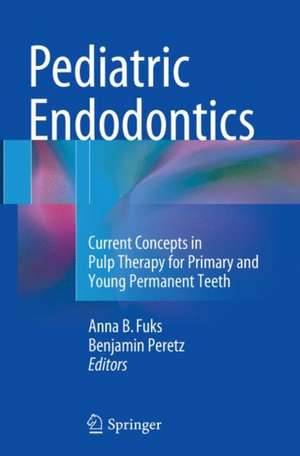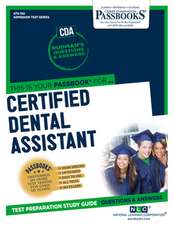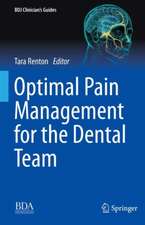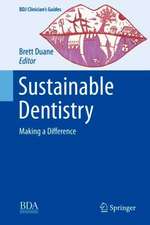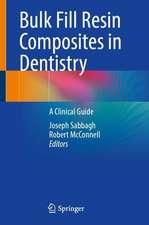Pediatric Endodontics: Current Concepts in Pulp Therapy for Primary and Young Permanent Teeth
Editat de Anna Fuks, Benjamin Peretzen Limba Engleză Paperback – 25 apr 2018
| Toate formatele și edițiile | Preț | Express |
|---|---|---|
| Paperback (1) | 697.79 lei 38-44 zile | |
| Springer International Publishing – 25 apr 2018 | 697.79 lei 38-44 zile | |
| Hardback (1) | 962.17 lei 38-44 zile | |
| Springer International Publishing – 10 mar 2016 | 962.17 lei 38-44 zile |
Preț: 697.79 lei
Preț vechi: 734.52 lei
-5% Nou
Puncte Express: 1047
Preț estimativ în valută:
133.54€ • 138.90$ • 110.24£
133.54€ • 138.90$ • 110.24£
Carte tipărită la comandă
Livrare economică 08-14 aprilie
Preluare comenzi: 021 569.72.76
Specificații
ISBN-13: 9783319801681
ISBN-10: 3319801686
Pagini: 164
Ilustrații: IX, 164 p. 87 illus., 26 illus. in color.
Dimensiuni: 155 x 235 x 19 mm
Ediția:Softcover reprint of the original 1st ed. 2016
Editura: Springer International Publishing
Colecția Springer
Locul publicării:Cham, Switzerland
ISBN-10: 3319801686
Pagini: 164
Ilustrații: IX, 164 p. 87 illus., 26 illus. in color.
Dimensiuni: 155 x 235 x 19 mm
Ediția:Softcover reprint of the original 1st ed. 2016
Editura: Springer International Publishing
Colecția Springer
Locul publicării:Cham, Switzerland
Cuprins
Pediatric Endodontics: Current Perspectives and Future Directions.- The Primary Pulp: Developmental and Biomedical Background.- Clinical Pulpal Diagnosis.- Indirect Pulp Treatment, Direct Pulp Capping, and Stepwise Caries Excavation.- Pulpotomy Techniques: Cervical (Traditional) and Partial.- Pulpectomy And Root Canal Treatment (RCT) in Primary Teeth: Techniques and Materials.- Restoration of Pulp Treated Teeth.- Pulp Therapy for the Young Permanent Dentition.- The Future: Stem Cells and Biological Approaches for Pulp Regeneration.
Notă biografică
Anna B. Fuks has more than 50 years of experience in dentistry and qualified as a Specialist in Pediatric Dentistry in 1978. She became a Fellow of the American Academy of Pediatric Dentistry in 1986 and was appointed Professor in the Department of Pediatric Dentistry, Hebrew University – Hadassah School of Dental Medicine in 1993; she has been Professor Emeritus since 2002, with responsibility for development of clinical research. Professor Fuks has been a board member of the International Association of Paediatric Dentistry (IAPD) since 2001 and served as the IAPD President from 2007 to 2009. She has received various awards during her career, including, in 2013, a Distinguished Service Award from the American Academy of Pediatric Dentistry (AAPD). Professor Fuks was a member of the editorial board of the journal Dental Traumatology from 2006 to 2014 and has been a board member of the Journal of the Israel Dental Association since 1996 and of Pediatric Dentistry since 2011. She is the author of more than 120 articles in peer-reviewed journals, as well as many book chapters.
Benjamin Peretz gained his board certification in Pediatric Dentistry in Israel in 1984. He was appointed Clinical Senior Lecturer in Pediatric Dentistry at The Hebrew University Hadassah School of Dental Medicine in 1992 and became Clinical Associate Professor in Pediatric Dentistry there in 1999. Professor Peretz served as Chairman of the Department of Pediatric Dentistry, Tel Aviv University School of Dental Medicine, from 2005 to 2014. He has sat on a variety of committees and is a longstanding member of the Professional and Examiners Committees for specialization in pediatric dentistry, the Scientific Council of The Israel Dental Association. Professor Peretz is Co-Editor-in-Chief of the Journal of Clinical Pediatric Dentistry and has been an editorial board member of the International Journal of Paediatric Dentistry since 2002; he also acts as a reviewer for a number of other leading journals. He is co-author of three books and more than 80 original articles in peer-reviewed journals.
Benjamin Peretz gained his board certification in Pediatric Dentistry in Israel in 1984. He was appointed Clinical Senior Lecturer in Pediatric Dentistry at The Hebrew University Hadassah School of Dental Medicine in 1992 and became Clinical Associate Professor in Pediatric Dentistry there in 1999. Professor Peretz served as Chairman of the Department of Pediatric Dentistry, Tel Aviv University School of Dental Medicine, from 2005 to 2014. He has sat on a variety of committees and is a longstanding member of the Professional and Examiners Committees for specialization in pediatric dentistry, the Scientific Council of The Israel Dental Association. Professor Peretz is Co-Editor-in-Chief of the Journal of Clinical Pediatric Dentistry and has been an editorial board member of the International Journal of Paediatric Dentistry since 2002; he also acts as a reviewer for a number of other leading journals. He is co-author of three books and more than 80 original articles in peer-reviewed journals.
Textul de pe ultima copertă
This book provides dental professionals with a clear understanding of current clinical and scientific knowledge on the various aspects of pulp treatment for both primary and young permanent teeth. Diagnostic parameters are clearly presented, along with step-by-step descriptions of clinical procedures, including indirect and direct pulp treatments, pulpotomy, and pulpectomy. The rationale for the materials used in each technique and their individual merits and disadvantages are examined in detail. In the case of pulpotomy, all the materials used since the introduction of this treatment modality are discussed (e.g., formocresol, glutaraldehyde, ferric sulfate, and MTA) and the roles of sodium hypochlorite, electrofulguration, and laser therapy are elucidated. Special attention is devoted to pulpectomy and root canal treatment, with consideration of debriding and obturation techniques, rinsing solutions, and root-filling pastes. A further individual chapter is dedicated to restorations of teeth treated with the different types of pulp therapy. The various conservative treatment modalities are also presented, including specific treatments for immature nonvital permanent teeth. The concluding chapter looks to the future and the potential value of stem cells in pulp therapy.
Caracteristici
Presents current clinical and scientific knowledge on pulp treatment for primary and young permanent teeth Describes clinical procedures step by step Explains the merits and drawbacks of different materials and the rationale for their use ?
